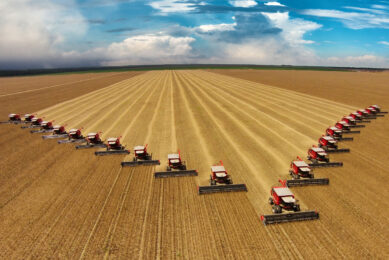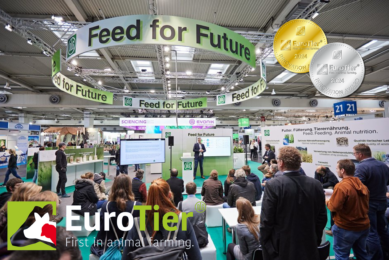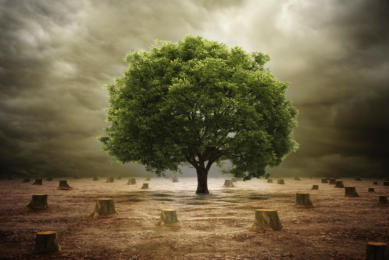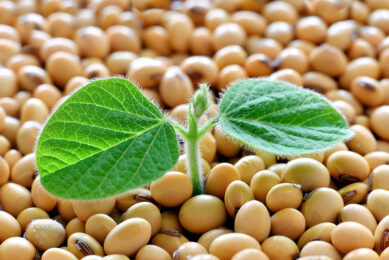Eurotier: Increasing EU sustainable soy production
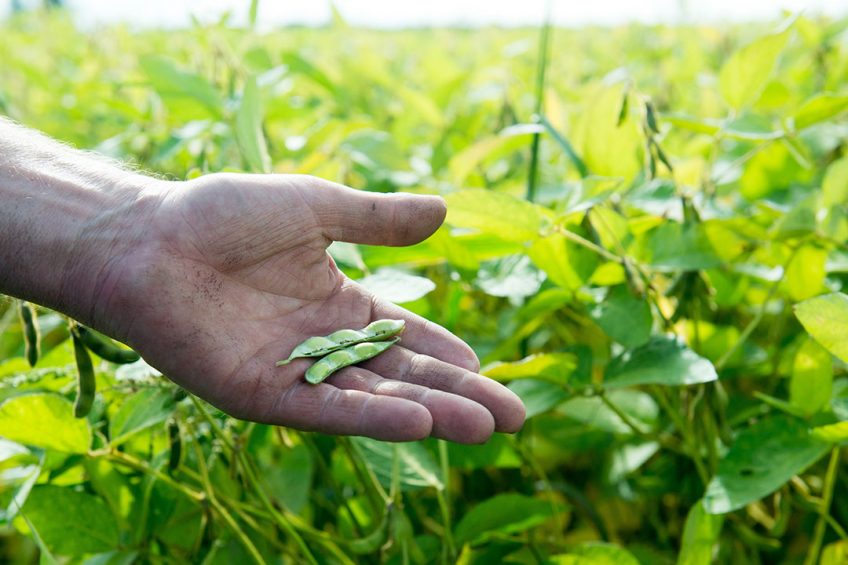
One of the many topics discussed during the digital programme of Eurotier was soy. In 2 online meetings, experts spoke about increasing the sustainable soy bean production in EU and how this will support the reduction of emissions in animal feed.
Protein partnerships are a perfect tool to increase sustainable soya bean production in Europe and meet the growing demand for consistent quality. Together with Donau Soja organisation, Lidl International introduced its partnership with 16 agricultural cooperatives in Serbia and Croatia at the digital EuroTier.
Soya is accountable for 50% of deforestation when it is imported into the EU.”
The goal for the partnerships was to produce more than 60,000 tons of soya according to Donau Soja standards and best practice in soy cultivation. Susanne Fromwald, executive director of Donau Soja, said: “Protein partnerships were designed as a programme to increase sustainable production and availability of certified soya beans in certified primary collectors at relatively low cost.
“They were also developed to further increase volumes to reach a tipping point where segregation costs go down and physical supply chains become economically feasible not only for niche markets and premium brands. And also for companies and retailers to compensate big soy volumes of non-sustainable or unclear origin. That’s where protein partnerships work as a European alternative to credits from overseas,” she said.
Training farmers in the best practices in soy production
Protein partners support and pay for the training of farmers in the best practices in soya production from choosing the variety to plant protection. The partners also pay for the certification costs of the farmer and of primary collectors. There are more partnerships to come in the future mostly in Ukraine where the potential volume is a minimum 500,000 tonnes.
One of the most important agricultural commodities for Lidl is soya,”
Lidl Stiftung: 100% sustainable soy by 2025
Judith Ginsberg, senior manager at one of the protein partners, Lidl Stiftung, said that by 2025 it will source 100% of the soya in its supply chains from sustainable sources. “One of the most important agricultural commodities for Lidl is soya,” said Judith. “We use 4 pillars to aim for our goal of sourcing 100% of the soya in our supply chains from sustainable sources by 2025. “These include certification of soya quantities, reducing the use of soya from overseas which can be risk areas, increasing the use of alternative protein sources and by creating transparency in the supply chain. We use the protein partnership to offset parts of the soya footprint from Lidl Germany, Austria and Switzerland for pig and beef products where the soya fed in the supply chain is not certified so far,” she said.
Benifits of protein partnership
Due to the protein partnership in 2019/2020, 60,000 tonnes of Donau Soja certified soya beans became additionally available and contributed to a number of benefits.
Judith said: “These include avoiding deforestation. As a result of the partnership replacing imports from overseas we avoided the conversion on up to 532 hectares of forest land in Brazil. We avoided up to 201,498 tonnes of CO2 emissions compared to a scenario with the total volume imported from Brazil. And, the partnership avoided the application of up to 3,660 litres of desiccants, for example Glyphosate or Diquat. We will continue with the programme as we are satisfied with the results so far and we even want to increase the volumes. This means we will include Ukraine as well this year,” she said.
Reducing emissions in animal feeding by domestic soya production
During a second discussion also focusing on soya at the digital EuroTier Susanne Fromwald from Donau Soja outlined how the organisation’s most important objectives are to support regional soya bean cultivation according to clearly defined quality criteria.
Susanne said: “Around 24% of global greenhouse gas emissions are due to agriculture and forestry. Livestock and feed plays an essential role here with about 60% of greenhouse gas emissions.
“Soya is accountable for 50% of deforestation when it is imported into the EU. Deforestation is the main driver for greenhouse gas emissions and that is why talking about soya in feed is a relevant issue,” she added.
EU imports of soy
Annually the EU imports about 14 million tonnes of soyabeans with 40% of this coming from Brazil. According to the EU around 20% of these imports are deforestation free. In March 2020, Donau Soja commissioned the Research Institute of Organic Agriculture (FiBL) in Austria to investigate how using Donau Soja/Europe Soya-certified soya products impacts the carbon footprint of food and feed products.
40% of Greenhouse Gas Emissions
After the research, the main result was that by using Donau Soja/Europe Soya this saw an overall reduction of 40% of Greenhouse Gas Emissions. Michael Wurzer, chief executive director, Austrian Poultry Association (ZAG), explained during the online meeting, that laying hens in the country have been fed Donau Soja Since 2014 which caused a ‘massive’ reduction in CO2. Michael said: “It is our mission to help the Austrian poultry farmers to adjust to the growing expectations of consumers, but we have to make sure that these efforts also lead to a better economic situation for the farmers and partners along the value chain.”
The impact on poultry of soya with different protein percentages
According to Wurzer, the initial problem for Austria was that it was importing soya from different parts of Europe that had varying climate conditions resulting in soya with different protein percentages.
In the end that caused economic and health problems which needed veterinary attention to solve. Since Austria changed to using Donau Soja all shell egg production uses it which has resulted in a saving of around 36% or about 110,000 tonnes of CO2.




